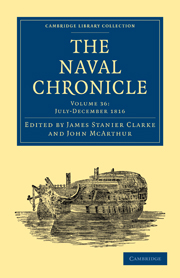 The Naval Chronicle
The Naval Chronicle Book contents
- Frontmatter
- PLATES IN VOLUME XXXVI. From Original Designs
- PREFACE TO THE THIRTY-SIXTH VOLUME
- ADDENDA TO THE BIOGRAPHICAL MEMOIR OF JOHN WESLEY WRIGHT, ESQ. CAPTAIN IN THE ROYAL NAVY
- ADDENDA TO THE BIOGRAPHICAL MEMOIR OF JOHN WESLEY WRIGHT, ESQ. CAPTAIN IN THE ROYAL NAVY
- ADDENDA TO THE BIOGRAPHICAL MEMOIR OF JOHN WESLEY WRIGHT, ESQ. CAPTAIN IN THE ROYAL NAVY
- ADDENDA TO THE BIOGRAPHICAL MEMOIR OF JOHN WESLEY WRIGHT, ESQ. CAPTAIN IN THE ROYAL NAVY
- BIOGRAPHICAL MEMOIR OF SIR DAVID MILNE, K.C.B. REAR-ADMIRAL OF THE BLUE SQUADRON
- BIOGRAPHICAL MEMOIR OF THE LATE ROBERT CAMPBELL, ESQ. CAPTAIN IN THE ROYAL NAVY
- INDEX
ADDENDA TO THE BIOGRAPHICAL MEMOIR OF JOHN WESLEY WRIGHT, ESQ. CAPTAIN IN THE ROYAL NAVY
Published online by Cambridge University Press: 10 January 2011
- Frontmatter
- PLATES IN VOLUME XXXVI. From Original Designs
- PREFACE TO THE THIRTY-SIXTH VOLUME
- ADDENDA TO THE BIOGRAPHICAL MEMOIR OF JOHN WESLEY WRIGHT, ESQ. CAPTAIN IN THE ROYAL NAVY
- ADDENDA TO THE BIOGRAPHICAL MEMOIR OF JOHN WESLEY WRIGHT, ESQ. CAPTAIN IN THE ROYAL NAVY
- ADDENDA TO THE BIOGRAPHICAL MEMOIR OF JOHN WESLEY WRIGHT, ESQ. CAPTAIN IN THE ROYAL NAVY
- ADDENDA TO THE BIOGRAPHICAL MEMOIR OF JOHN WESLEY WRIGHT, ESQ. CAPTAIN IN THE ROYAL NAVY
- BIOGRAPHICAL MEMOIR OF SIR DAVID MILNE, K.C.B. REAR-ADMIRAL OF THE BLUE SQUADRON
- BIOGRAPHICAL MEMOIR OF THE LATE ROBERT CAMPBELL, ESQ. CAPTAIN IN THE ROYAL NAVY
- INDEX
Summary
In the conclusion of Captain Wright's personal narrative, there is an evident indication of distrust respecting the future conduct of the French government, in the ultimate disposal of him. He knew that a vindictive policy pervaded its measures, and might extend to him, although a mere individual, no otherwise discriminative than as a public enemy, active in the execution of the duties assigned him. But a tyrannical resentment is rarely exerted on its ostensible motives.
When Buonaparte had so distinguished himself by his extraordinary success in the republican cause, as to feel its consequences in the possession of an imperative influence on the army, and in a consciousness of the power it gave him—personal ambition, self-aggrandizement, and not the cause of France, became the motive of his public conduct.
He had subverted that constitution, for which, however erroneously considered as the palladium of popular liberty, the people had bled, and which he had engaged to maintain. He had, like another Cromwell, insulted the nation, by driving from their House of Assembly, with an armed force, its constitutional representatives; and finally, he had so far ascended, as to rule by no will but his own, and had planted disappointment in the breast of every unbought Frenchman, when the malign jealousy and suspicion of such a character, in such a situation, was to be excited and vexed by the noble firmness of a British captive.
- Type
- Chapter
- Information
- The Naval ChronicleContaining a General and Biographical History of the Royal Navy of the United Kingdom with a Variety of Original Papers on Nautical Subjects, pp. 89 - 176Publisher: Cambridge University PressPrint publication year: 2010First published in: 1816


